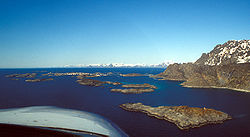archipelago
Hello, you have come here looking for the meaning of the word archipelago. In DICTIOUS you will not only get to know all the dictionary meanings for the word archipelago, but we will also tell you about its etymology, its characteristics and you will know how to say archipelago in singular and plural. Everything you need to know about the word archipelago you have here. The definition of the word archipelago will help you to be more precise and correct when speaking or writing your texts. Knowing the definition ofarchipelago, as well as those of other words, enriches your vocabulary and provides you with more and better linguistic resources.

An archipelago from above.
English

Etymology
From Italian arcipelago, formed on the basis of Ancient Greek ἀρχι- (arkhi-, “main”) + πέλαγος (pélagos, “sea”), a designation for the Aegean Sea. (Compare arch- and high seas.) The Aegean Sea is a sea with many islands; the term Arcipelago, originally a proper noun referring to the Aegean Sea, was first generalized to a common noun for any sea with many islands, and then to the islands in such a sea.
Pronunciation
- (Received Pronunciation) IPA(key): /ˌɑːkɪˈpɛləɡəʊ/
- (US) IPA(key): /ˌɑɹkəˈpɛləˌɡoʊ/
Audio (US): (file) - Hyphenation: ar‧chi‧pe‧la‧go
Noun
archipelago (plural archipelagos or archipelagoes)
- (collective, geography) A group of islands.
- 1851 November 14, Herman Melville, Moby-Dick; or, The Whale, 1st American edition, New York, N.Y.: Harper & Brothers; London: Richard Bentley, →OCLC:
- For many years past the whaleship has been the pioneer in ferreting out the remotest and least known parts of the earth. She has explored seas and archipelagoes which had no chart, where no Cook or Vancouver had ever sailed.
- (now rare, specifically) The Aegean Sea.
- 1791, Charlotte Smith, Celestina, Broadview, published 2004, page 413:
- n his imagination he had settled his route, through Holland and France to Sicily, which he had long wished to see, and from thence to the Archipelago .
- (by extension) Something scattered around like an archipelago.
- The Gulag Archipelago
Derived terms
Translations
group of islands
|
Verb
archipelago (third-person singular simple present archipelagos, present participle archipelagoing, simple past and past participle archipelagoed)
- (transitive, rare) To scatter or be scattered so as to resemble a group of islands.
- 1912, Samuel John Alexander, “The Regions Which Are Holy Land”, in The Inverted Torch, and Other Poems, San Francisco, C.A.: A. M. Robertson, page 183:
- As the seas level, as the seas / Swept into ripples by the breeze, / And archipelagoed by trees, / Majestic spreading oaks, that rise / Like island walls against the skies.
- 1924, William A Quayle, Out-of-Doors with Jesus, New York, N.Y., Cincinnati, O.H.: Abingdon Press, page 196:
- There is no debating that there is a Gardener whose gardens are spontaneous as a sunup, no crimson and purple clouds archipelagoing the morning skies.
- 1944, Thomas Ewing Dabney, One Hundred Great Years: The Story of the Times-Picayune From Its Founding to 1940, Baton Rouge, L.A.: Louisiana State University Press, page 432:
- Crevasse! The word which describes the frightful chasm into which nature's mighty stresses break glaciers, the people of the Lower Mississippi applied to the river when its destruction burst upon the land. It meant a rush of water which might be fifteen feet high and a hundred feet wide the first hour, four hundred the next, and half a mile the next day; and which hurled itself upon towns and plantations, to gouge vast cavities and carry destruction fifty miles a day; the current sweeping away everything in its immediate path, but losing its violence farther away in the placidity of a vast sea archipelagoed by tree tops and house roofs and beaconed by factory chimneys.
- 1987, Jeremy Reed, Blue Rock, London: Jonathan Cape, →ISBN, page 53:
- For a long time he had kept a pet crow called Topsy; it ate gobbets of cheese from his hand and archipelagoed the floor of his hut with droppings.
Derived terms
See also
Further reading
 archipelago on Wikipedia.Wikipedia
archipelago on Wikipedia.Wikipedia
Portuguese
Noun
archipelago m (plural archipelagos)
- Pre-reform spelling (used until 1943 in Brazil and 1911 in Portugal) of arquipélago.